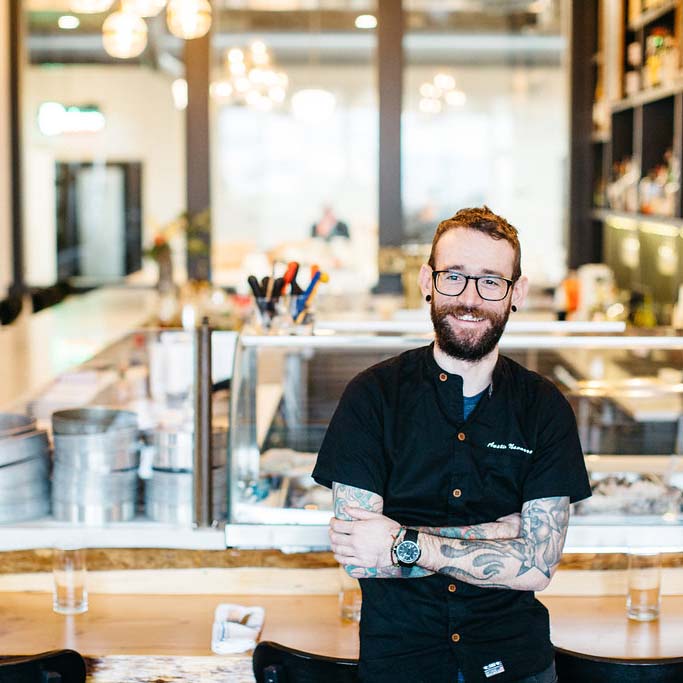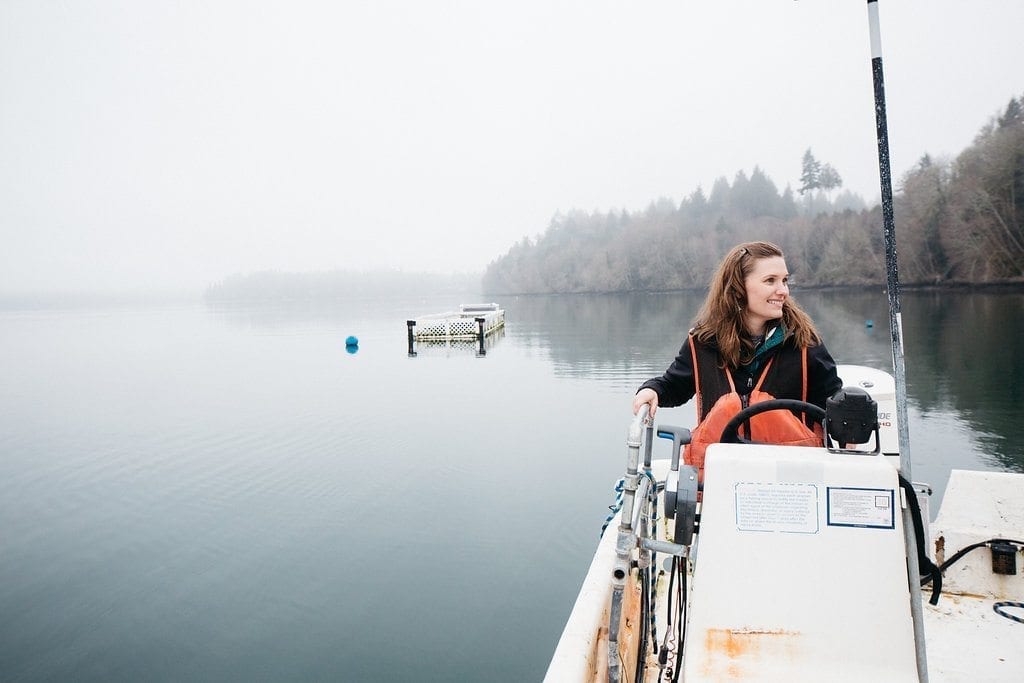More Than Just Seafood at Chelsea Farms Oyster Bar

In late 2016, small-town Olympia, Washington, got a welcome addition to its sleepy culinary scene: Chelsea Farms Oyster Bar.
Chef Austin Navarre and co-owner Shina Wysocki, share their multi-tiered approach to sustainability, why the best way to cook seafood is to let it shine, and why giving people access to food grown nearby is a recipe for success.
Let’s start at the beginning: What is your earliest seafood memory?
Austin: Believe it or not, growing up we used to fish for catfish and salmon. I’m from the other part of the state [Eastern Washington] where there isn’t a lot of fresh seafood. The options were salmon in the river, catfish, and trout. I moved to Seattle when I was 18 and ate my first oyster and the rest is history.
How would you describe your approach to seafood here at Chelsea Farms Oyster Bar?
Austin: I keep it simple by introducing complementary flavors and making sure the fish is the star of the dish, whether that’s texture or flavor. Especially with oysters. Too many people mask the flavor of the oyster, which if you do so, why are you eating oysters?
Grab Austin’s Barramundi with Carrot Ginger Purée and Forbidden Rice recipe!
What does sustainability mean to Chelsea Farms Oyster Bar and why is it important?
Shina: For us on the farm, sustainability has always been multi-tiered. The oysters that we’re growing are sustainable for the environment, they are sustainable economically, but they are also a part of the community. Before opening the Chelsea Farms Oyster Bar we shipped all of our product out of state. To have our oysters featured here in Olympia so that people can eat the food that’s grown here and understand it, I see that as the largest part of our sustainability.

The oyster bar has been opened just a few months, how is the community responding?
Austin: The community has been incredibly supportive. People are just happy that we’re here. I hear a lot of people say, “This doesn’t seem like I’m in Olympia,” which I take as a compliment. They don’t need to leave town to have a mini vacation for a few hours. They can sit at the bar, eat great food, and walk back out to small-town Olympia.
Shina: South Puget Sound is a huge producer of shellfish and we grow a lot of oysters here. I think it’s important for whatever is grown in the community to be featured in its restaurants. That makes people excited.
What are your thoughts on the current state of seafood?
Austin: For a while things got a little weird, but with more accountability and traceability things are turning around. Now, certain farm-raised seafood comes with a tag telling you when it was harvested. And living here in the Pacific Northwest, you get fish and you know exactly where it was caught and what it is.
Shina: People are eating more seafood. It’s easier on the environment than other forms of protein. It’s really healthful, and I think people appreciate that about it. Seafood is also really delicious.
At the farm, we have definitely seen an increase in more people enjoying oysters on the half shell. I think part of it is the traceability and sustainability of oysters: They are naturally traceable back to the farm.
There are so many misconceptions about fish: If you were going to debunk one once and for all, what would it be?
Austin: That all fish is funky. Some of my family, who live in Eastern Washington, think that all fish is funky. But they haven’t had fresh seafood, which is mild, yet flavorful in the right—not funky— ways.
Shina: I get that from my Midwest family, too. They expect seafood to be strong in flavor, fishy, which is exactly what it should never be.
For me, personally, I used to not like farmed fish, both environmentally and flavor-wise. I find that both are no longer true, there are great farmed finfish that are delicious tasting and environmentally friendly.
Do you have any advice for up-and-coming chefs or food entrepreneurs that want to get into sustainable seafood?
Shina: Try things and talk to people. If you can, go down the docks to meet the fishermen, meet the farmers who are raising things. The more things you try the more you’ll know about it. That’s the way you get to know anything, you just try it, work with it.
Austin: Do the leg work. There are so many chefs I’ve known that just sit in an office. When I first started here at Chelsea Farms Oyster Bar, they sent me to Chicago and Los Angeles to see all these different things. Education is a huge thing. You can only learn so much in the kitchen.
RECIPE: Barramundi with Carrot Ginger Purée and Forbidden Rice by Austin Navarre